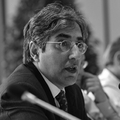Surendra Munshi
Speaker

Prof. Dr Surendra Munshi, professor emeritus of sociology at the Indian Institute of Management in Calcutta, has taught and researched in India and abroad. He was the academic head of an international project on good governance that was supported by the European Commission in which several European institutions of higher education took part. The outcome of this project has appeared as a book under the title Good Governance, Democratic Societies and Globalisation (Sage, 2004). More recently, he has co-published yet another book on this theme: The Intelligent Person’s Guide to Good Governance (Sage, 2009). His recent publications include: ‘For Great Leadership’ in Fabrice Lehmann and Jean-Pierre Lehmann (eds.), Peace and Prosperity through World Trade (CUP, 2010); ‘Learning Leadership: Lessons from Mahatma Gandhi’, Asian Journal of Social Science 38 (2010) 37-45; ‘Universalising Europe: In the Spirit of Rabindranath Tagore’, Asian Journal of Social Science 39 (2011) 296-303. Regularly, he is invited to international conferences and expert meetings. So, at the invitation of Vaclav Havel, Former President of the Czech Republic, he took part in the annual Forum 2000 Conference, Prague in October 2011 (Theme: Democracy and the Rule of Law) where he moderated two panels. He serves as a Member of the Council of Global Thought Leaders for the project on Globalisation, Corporate Leadership & Inclusive Growth, a project of the Evian Group at the International Institute for Management Development (IMD), Lausanne.
ZAK asked Prof. Dr Surendra Munshi to answer the following questions:
1. Has our need for security grown, or has our perception of danger and uncertainty simply changed?
I think there is ‘more’ of everything: we see more, we are more vulnerable, and we are more under danger. I remember soon after September 11 reading news of the anxiousness from which New Yorkers were suffering, fearing another round of attacks. I read news of retaliatory attacks in Afghanistan as well. It was during this charged atmosphere when aerial bombing in Afghanistan was to begin any time that I saw a picture that appeared in newspapers of a carefree baker in Kabul making his local breads. It was business as usual for him. This made me think that there was a perceptible difference in the attitude of the baker in Kabul and the people living in New York. For him, danger – not security – was routine, unlike for New Yorkers. Dangers and uncertainties of different kinds have touched persons long unused to them.
2. To what extent are the interdependencies among individual risks increasing? Can a domino effect be seen here?
Dangers and uncertainties are connected, more than ever before at a global level. I remember going to buy vegetables in Calcutta some time soon after Saddam Hussein invaded Kuwait. When I asked the vegetable seller why he was asking an exorbitant price for potatoes, he asked me in turn whether I knew of the invasion of Kuwait. On my telling him that I did but I did not see the connection, he explained patiently that potatoes did not grow in Calcutta but had to be brought in from outside and for that, transportation was involved, and that transportation required petroleum, the supply of which was affected due to the invasion. Did I expect, he asked, him to bear the higher transportation cost? He was being blatantly opportunistic, for there was no hike in petroleum prices locally at that stage when he was demanding a higher price for his potatoes. This showed though he knew well how the world down to the level of a petty vegetable seller in Calcutta was interconnected. The IMF is, for example, warning that the escalating Euro zone debt crisis could derail the global economic recovery. The world, including Europe, is still paying a price for the greed of some, notably located on Wall Street.
Dangers and uncertainties of different kinds are related. Economic crisis is related with political crisis which in turn is related with moral crisis which in turn is related with economic crisis and so on in a threatening spiral. Some take advantage of these dangers and uncertainties, more powerful than my vegetable seller in Calcutta.
3. In light of the current crisis, should more decision-making authority be transferred to European institutions/organs?
The Euro zone crisis is serious and it requires the kind of policy initiative that considers the zone as a whole and addresses the crisis resolutely. European institutions can and should play a positive role here. They need to be strengthened. At the same time, this should not cause democratic deficit, for no initiative can be sustained on that basis.

